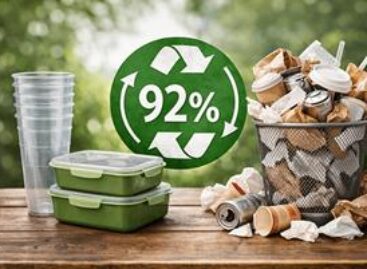One billion plastic particles per wash – dishwashers are one of the most important producers of microplastics
According to a recent study published in the American Chemical Society’s journal ES&T Water, washing plastic containers and utensils in a dishwasher releases billions of plastic particles into wastewater – reported by Körkörös.hu.
As reported in several articles by Körkörös.hu: microplastics are already present in massive quantities in our seas and environment, and even during the heating of plastic containers they have already appeared in our bodies. Recently, researchers investigated a previously less studied source of microplastic pollution and found that a typical dishwasher loaded with plastic items can release approximately 920,000 microplastic and nanoplastic particles in a single wash, which translates to 33 million particles per household annually on a global scale.
The dishwasher leads in the “production” of micro- and nanoplastics partly because, during cleaning, the plastic utensils inside are subjected to chemical and physical (scrubbing, scouring) effects, sometimes at temperatures up to 72 degrees Celsius.
This plastic mass amounts to only about 6 milligrams per person per year – roughly a quarter of the weight of a grain of rice – but wastewater treatment plants receive much more than this, and since current treatment systems cannot completely remove microplastics, they end up in rivers, significantly harming ecosystems.

Source: ES&T Water
Dr. Elvis Okoffo, a researcher at the University of Queensland’s Alliance for Environmental Health Sciences, stated that household dishwashers have so far been an unrecognized source of plastic pollution. “Even seemingly harmless everyday actions can have cumulative environmental consequences. The release of plastics into the environment can have harmful effects on both the environment and human health. This study highlights the need to pay closer attention to the plastics we use, how we clean them, and how we dispose of them,” he told Phys.org.
The solution could lie in installing filters on dishwashers to capture microplastics before they enter wastewater – said Dr. Okoffo, adding that it is better to remove the pollutant before it enters the environment than to take costly measures after it has been released.
Related news
2026 could be the year of the circular economy: are we ready for the turnaround?
🎧 Hallgasd a cikket: Lejátszás Szünet Folytatás Leállítás Nyelv: Auto…
Read more >Related news
Tesco sets out store expansion plans in 2026 including five former Amazon Fresh sites
🎧 Hallgasd a cikket: Lejátszás Szünet Folytatás Leállítás Nyelv: Auto…
Read more >Brits Embrace At‑Home Celebrations While Germans Cut Back on Valentine’s Day Spending
🎧 Hallgasd a cikket: Lejátszás Szünet Folytatás Leállítás Nyelv: Auto…
Read more >








